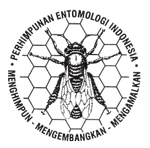The effectiveness of vegetable oil formulations in reducing oviposition of Bactrocera dorsalis Hendel (Diptera: Tephritidae) in large red chili fruits
DOI:
https://doi.org/10.5994/jei.15.2.87Keywords:
coconut oil, edible oil, irritant, neem oil, oriental fruit flyAbstract
Chili peppers (Capsicum annuum), in their many varieties, constitute a culturally and economically important horticultural crop in a number of countries. The Indonesian cayenne large red chili (Capsicum annuum var. annuum) is used widely in Indonesia mainly in cooking. There have been reports of increased infestation of large red chili by insect pests, particularly fruit flies. The aim of this study was to investigate the effectiveness of five edible vegetable oils (palm oil, coconut oil, soybean oil, corn oil, and candlenut oil) and one non-edible vegetable oil (neem oil) in reducing landings, oviposition, and infestation by the Oriental fruit fly (Bactrocera dorsalis Hendel) in large red chili fruits. This lab-based experiment entailed exposure of large red chili fruits to 20 mature B. dorsalis females (14–21 days old) inside a 15-l plastic container. Six separate containers each held 10 large red chili fruits with a single oil treatment in each. Prior to exposure, each of the treated and control large red chili fruits was punctured once with a needle in order to create an opening for oviposition. Results indicate that the coconut oil formulation was most effective in preventing damage from B. dorsalis females, and reducing fruit fly landings, oviposition, and infestation.
Downloads
Downloads
Published
How to Cite
Issue
Section
License
Copyright (c) 2018 Jurnal Entomologi Indonesia

This work is licensed under a Creative Commons Attribution 4.0 International License.
Authors who publish with this journal agree to the following terms:
- Authors retain copyright and grant the journal right of first publication with the work simultaneously licensed under a Creative Commons Attribution 4.0 International License that allows others to share the work with an acknowledgement of the work's authorship and initial publication in this journal.
- Authors are able to enter into separate, additional contractual arrangements for the non-exclusive distribution of the journal's published version of the work (e.g., post it to an institutional repository or publish it in a book), with an acknowledgement of its initial publication in this journal.
- Authors are permitted and encouraged to post their work online (e.g., in institutional repositories or on their website) prior to and during the submission process, as it can lead to productive exchanges, as well as earlier and greater citation of published work (See The Effect of Open Access).








